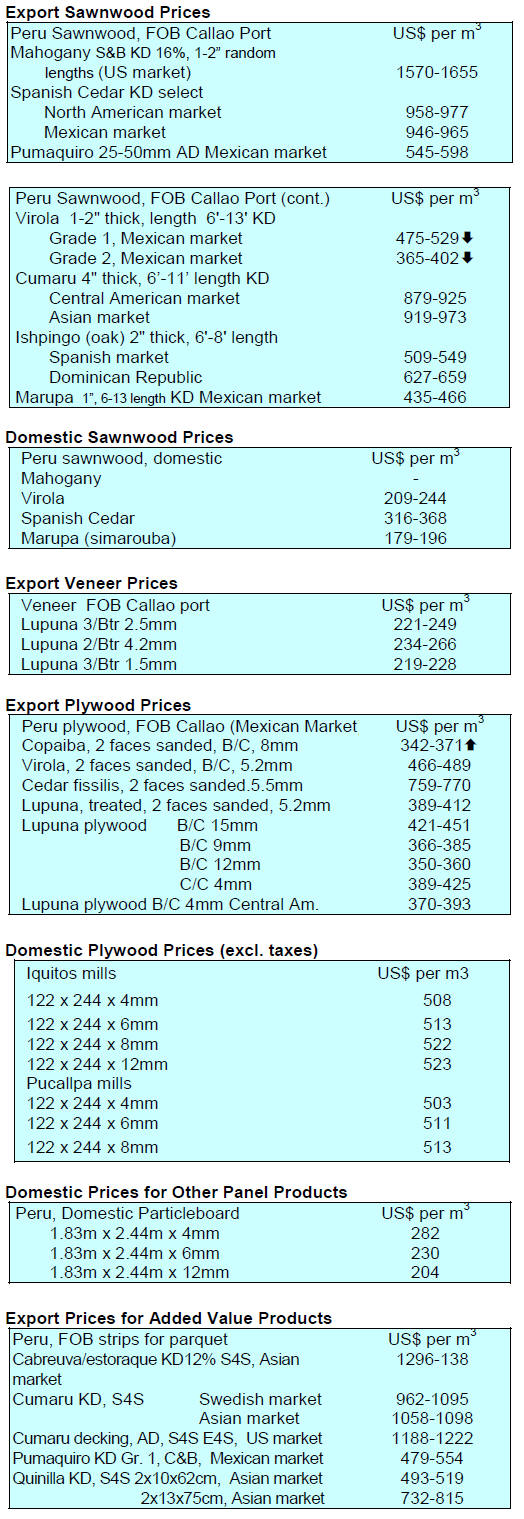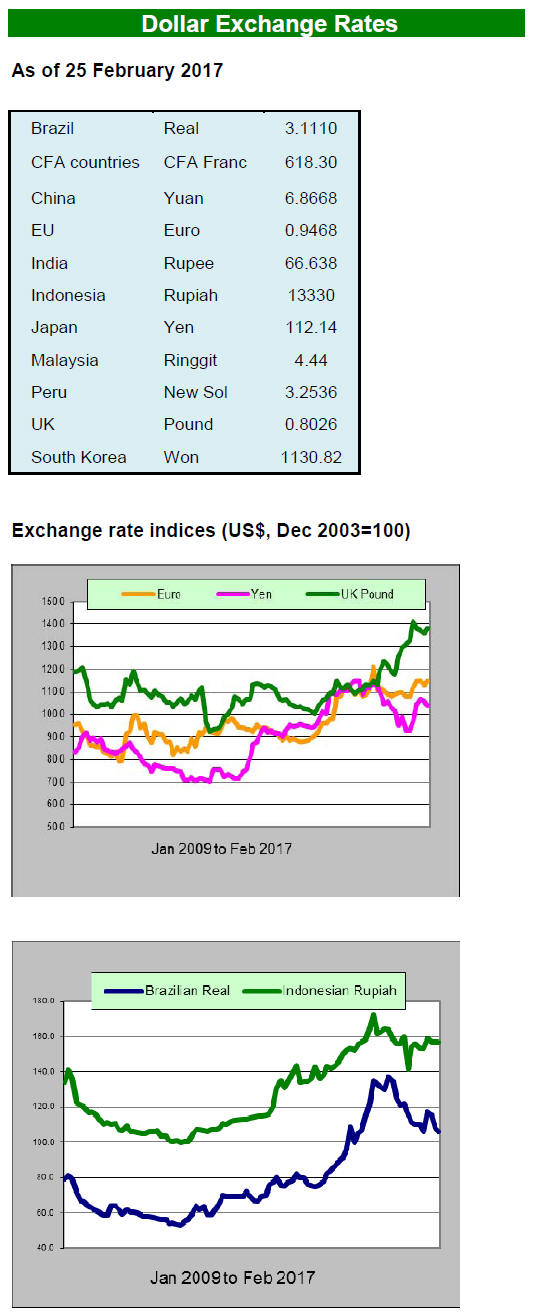2. GHANA
Minister firmly supportive of forest
plantation strategy
The newly appointed Minister of Lands and Natural
Resources, John-Peter Amewu, visited the Forestry
Commission and the Ghana Geological Survey Authority
recently.
The minister said he will be taking action to eliminate the
high levels of illegal logging and chainsaw milling which
undermines the efforts of the Forestry Commission.
The minister noted that poor farming practices, annual
burning, population pressure, the complex nature of
Ghana’s land tenure system and weak law enforcement are
serious challenges to be addressed.
The new minister is firmly behind the plans to
expand
forest plantation development as well as efforts to
encourage the bamboo and rattan industries.
Relief on electricity rates for strategic sectors of
economy
During a recent address to the nation, President Nana
Addo Dankwa Akufo-Addo said the government will
immediately act to lower some of the levies and taxes on
electricity tariffs despite the US$2.5 billion debt weighing
on the energy sector. The government plan includes
improving transparency in tariff setting and introducing a
new tariff policy for strategic industrial consumers.
The President said while Ghana produces power from its
domestic facility at around three US cents per kilowatt
hour the price charged to businesses is ten times more than
the average across West Africa noting that under such
conditions it is very difficult for industries in Ghana to be
competitive.
See:
http://www.ghanaweb.com/GhanaHomePage/business/Taxeslevies-
on-electricity-tariff-to-be-reduced-President-Akufo-Addo-
512716
New container terminal for Takoradi by March
Hellenic Shipping news has reported that IBISTEK, a
Ghanaian owned company, in collaboration with the
Ghana Ports and Harbour Authority (GPHA), has
completed the first phase of construction of a new
container terminal and could begin to accept containers by
the end of March.
IBISTEK has said all containers that arrive at the Takoradi
Port from 4 March this year would be sent to the new
terminal. This multi-million dollar project should improve
the efficiency at the port.
See: http://www.hellenicshippingnews.com/takoradi-port-offdock-
container-terminal-to-start-receiving-cargo/
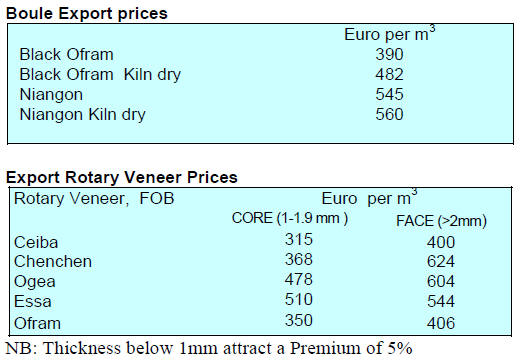
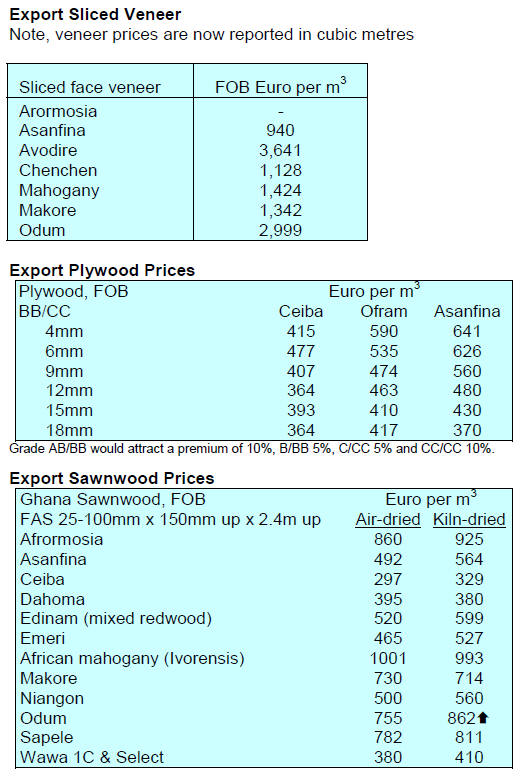
3.
SOUTH AFRICA
Residential housing demand robust in 2016
The South African Statistics Department has released data
showing the value of approved building plans increased by
6.0% (R6,068.1 million) in 2016 compared to 2015. All
three major building categories recorded increases.
The largest percentage increase was recorded for
residential buildings (7.1% or R3,590.5 million), followed
by non-residential buildings (6.5% or R1,589,8 million)
and additions and alterations (0.4% or R887.8 million).
The value of buildings reported as completed increased by
8.3% (R4 723,6 million) in 2016 compared to 2015. All
three major building categories recorded increases.
The largest percentage increase was recorded for
residential buildings (8.7% or R2,789.7 million), followed
by non-residential buildings (8.6% or R1,257,1 million)
and additions and alterations (6.9% or R676.8 million).
Rand exchange rate fixing uncovered
South Africa’s Competition Commission has accused 17
international and local banks of colluding to fix the price
of the country’s currency, the rand, over the past decade.
The Commission said in a statement that workers at more
than a dozen global banks were involved.
Fines up to 10% of the banks' South African
revenues will
be imposed. Four major banks involved in the scandal
account for around 90% of the national banking market.
See:
http://www.compcom.co.za/wpcontent/
uploads/2017/01/Competition-Commission-prosecutesbanks-
currency-traders-for-collusion-15-Feb-2016.pdf
Retail sales growth slows in 2016 - survey points to a
weak start in 2017
2016 retail sales growth slowed to 1.9% year on year from
the 3.3% growth in 2015 marking the slowest rate of
increase since the 2008/09 recession.
Consumer spending has been held back by high
unemployment which affected disposable income and
consumer confidence. Other data shows that there was a
contraction in credit in 2016.
While reports suggest 2017 inflation will be flat and will
favour household finances, this positive effect could be
off-set by tax increases likely to be announced in the 2017
Budget. As such, consumer spending could remain
restrained.
4.
MALAYSIA
Dutch public procurement policy
recognises Malaysian
certification
The Government of The Netherlands has announced the
acceptance of the Malaysian timber certification scheme as
compliant with the Dutch public procurement policy for
sustainable timber.
This decision, said Himmat Singh, Chairman of the
Malaysian Timber Certification Concil (MTCC), marks an
important milestone for Malaysia’s scheme and is a
significant endorsement of Malaysia’s commitment and
ongoing efforts in promoting sustainable forestry and
timber industry through a timber certification scheme.
The MTCC believes acceptance of the MTCS within the
Dutch public procurement policy for sustainable timber
will allow Malaysian wood based companies to enjoy
better access to the Dutch markets.
The Dutch market currently accounts for about 30% of the
total export of PEFC/MTCS-certified timber products
from Malaysia. Certified timber products from Malaysia
constitute approximately 50% of the total certified tropical
timber imported into the Dutch market.
This volume is approximately the same as the volume of
PEFC/MTCS-certified timber collectively imported by
other EU member states with operational sustainable
timber procurement policies, namely United Kingdom,
Germany, France, Belgium and Denmark.
In related news, Sabah’s Forestry Department Director,
Sam Mannan, said timber from the state is gaining
worldwide acceptance amid concerns that the forest
products must come from sustainable sources.
More and more timber companies in the state are securing
international certification. Bornion Timber was the latest
company in the state to be certified under the MTCS.
Mannan commented that satisfying all the requirements of
certification schemes is not easy and Bornion Timber has
worked hard over the years to achieve this.
See:
http://www.mtcc.com.my/news-items/malaysian-timbercertification-
scheme-fully-accepted-in-the-netherlands/
http://www.thestar.com.my/business/businessnews/
2017/02/07/dutch-govt-recognises-malaysian-timbercertification-
scheme/
Now only short-term logging licenses in Sarawak
The new Chief Minister of Sarawak, Abang Johari Tun
Openg, has announced that, with immediate effect, only
short-term timber license by way of a tender process will
now be offered to timber companies. This is to ensure that
licenses are awarded in a transparent manner.
The statement from the State government says short-term
timber license would be issued by open tender for state
land forest that had been approved for development as
well as for native customary land development area and
native communal reserve earmarked for development.
The statement from the Chief Minister’s office the says
Forest Department would fine-tune the mechanism for the
award of timber licenses for forest area on land subject to
Native Customary Rights (NCR), taking into consideration
the interest of the community involved.
Easing of cabotage policy
The Malaysian Transport Ministry has agreed to ease the
cabotage policy in respect of Sabah as a step towards
helping the state’s economic growth. Sarawak is also
calling for an easing of the old policy.
(Cabotage:the transport of goods or passengers between two
places in the same country by a transport operator from another
country. It originally applied to shipping along coastal routes,
port to port, but now applies to aviation, railways, and road
transport as well.)
There has been an on-going debate on the causes behind
the higher cost of many consumer goods in Sabah and
Sarawak compared to Peninsular Malaysia and this has
been largely attributed to Malaysia’s cabotage protection.
Under the cabotage policy, shipping vessels from
anywhere in the world are required to berth at Port Klang
in Peninsular Malaysia and cargo unloaded before tbeing
transshipped to Sarawak and Sabah by Malaysian
registered vessels. This double handling raises costs which
have to be passed on to consumers.
Many calls have been made in Sabah and Sarawak for the
cabotage1980 policy implemented by the Transport
Ministry to be reviewed or abolished to address the higher
prices of goods in the two states.
Bombay Timber Merchants Association visits
Sarawak
After meeting the Minister of Plantation Industries and
Commodities in Kuala Lumpur a delegation of timber
merchants from Mumbai visited Sarawak. The delegation
was led by Bombay Timber Merchants Associations
(BTMA) chairman Mohd. Iqbal S. Chhapra. The visit was
to strengthen bilateral trade of timber and timber products
between India and Sarawak.
Iqbal said association members were hoping to acquire an
insight into the wood-based industry in Sarawak
particularly on facilities to produce and supply sawn
timber due to the high demand from India.
To ensure smooth business, he urged Sarawak exporters to
adhere to the Indian market requirements, including the
need to fumigate sawn timber and to work closely with
their Indian counterparts in order to sustain the market.
India is the second largest export market for Sarawak in
terms of timber and timber products with logs being the
main export items. Concerted efforts are being made to tap
the potential of the Indian market in order to boost the
export of plywood, sawn timber and other value-added
products.
Sarawak earned RM970 million from the export of timber
and timber products to India in 2016 compared with
RM1.25 billion in 2015. The main export products were
logs, followed by plywood and sawnwood.
See:
http://www.theborneopost.com/2017/02/22/indian-timbermerchants-
here-on-working-visit/
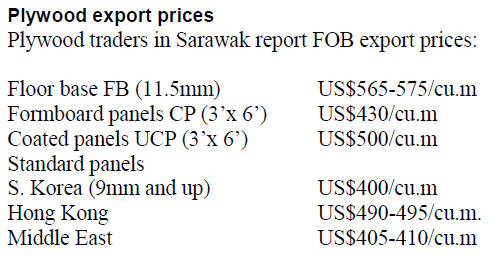
5. INDONESIA
Forest concessionaires could contribute
more to
economy says Association
Chairman of the Association of Indonesian Forest
Concessionaires (APHI), Indroyono Susilo, has claimed
that allocated natural forest concessions could generate a
much greater contribution to the economy if they were
fully utilised.
The problem, says Susilo, is that the private sector is
reluctant to invest to raise production because the business
climate is not attractive.
Efforts by the government and the private sector to
conclude the national timber legality verification system
(SVLK) to satisfy the EUTR is having little impact on
investment sentiment says Susilo.
Despite having easier access to EU markets and having
absorbed the cost of EUTR, compliant companies are
finding their wood products are not attracting better prices.
In related news, the Executive Director of APHI, Purwadi,
has opened the debate on log sales again by pointing out
that APHI members could get much better prices in
international markets for raw materials than in the
domestic market.
Is FSC ready to modify 1994 rule?
The Indonesian media are reporting that Kim Carstensen,
Director General of the Forest Stewardship Council (FSC),
advised FSC International that he recognises the 1994 FSC
rule is not appropriate for Indonesia and is a major
obstacle for Indonesian industries to secure FSC
certification.
This rule excludes FSC certification of plantations
established in areas converted from natural forests after
November 1994.
Reports say FSC plans to revise this rule which would
allow Indonesian timber companies to obtain certification
from FSC if they wish. The head of the Department of
Forest Management, Faculty of Forestry, UGM
(Universitas Gadjah Mada), Ahmad Muryadi, pointed out
that many of Indonesia's forest plantations were
established after 1994.
For more see:
http://www.cnnindonesia.com/ekonomi/20170209143603-92-
192344/demi-indonesia-fsc-ubah-aturan-sertifikasi-kayu-tahunini/
Expanded manufacturing the path to job creation
The Indonesian President has once again called for action
to increase investment in the manufacturing sector to
create a more diversified economy and thus be less reliant
on the trade in commodity products. He said the country is
yet to fully benefit from expansion of downstream
processing.
The government has a target of providing jobs for 16.3
million workers in 2017, an increase of 5% on 2016
figures and expanded manufacturing is the answer.
Industries that create most jobs include textiles, footwear,
food products and tourism.
With most foreign investment being in capital intensive
industries it falls on local investors to invest in labour
intensive production.
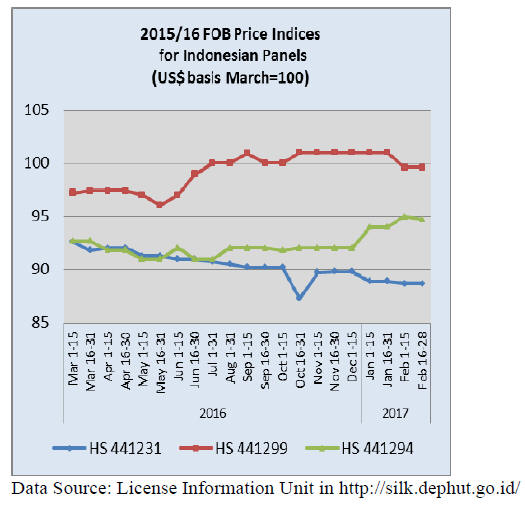
6. MYANMAR
Myanmar TLAS not a ‘quick-fix’ for
legality verification
The Myanmar Forest Certification Committee (MFCC)
has conducted the last of its recent workshops on Gap
Assessment as part of preparations for the Myanmar
timber legality assurance scheme (TLAS). The work on
TLAS is being conducted with assistance from the EUFAO
FLEGT programme.
This workshop attracted many international participants
especially because of the recent case when a Swedish
importer of Myanmar teak was penalised for failing to
show due diligence.
Some civil society groups expressed concern that
Myanmar’s TLAS could weaken the resolve of
stakeholders to see through what are considered essential
reforms in the forestry sector.
MFCC Secretary, Barber Cho, clarified that Myanmar’s
TLAS project was initiated in 2014 long before the recent
accusations that the legality of some of Myanmar’s timber
exports could not be verified. He emphasised that there is
no risk that the Myanmar system could be used as a ‘quick
fix’ for legality verification.
He also reiterated that the commissioning the country’s
TLAS will be conducted through dialogue with all
stakeholders.
The certification workshop was advised that the Forestry
Department intends to use the results of the Gap Analysis
to strengthen the current legality verification system.
Myanmar Timber enterprise (MTE) is planning to apply a
data base system to trace the origin of timber when
harvesting begins after one-year logging suspension.
Currently, MTE is using hammer markings on one end of
log and log numbering from which the supply chain can be
tracked.
When the harvesting ban is lifted the indications are that
MTE will fell and harvest around 20,000 teak tree and 600
000 hardwood trees in this year ( Myanmar’s Annual
Allowable Cut is defined by the number of trees that can
be felled. Each tree yields from 1.2 to 1.5 Hoppus tons).
The focus of attention of international workshop
participants was largely on how the Forestry Department
can immediately strengthen traceability and legality
verification. Many participants from Myanmar pointed out
that importing countries, including the EU, need to apply
the same stringent rules to wood products manufactured
from Myanmar teak and other hardwoods and exported by
other countries.
In related news Chairman of Myanmar Timber Merchants
Association, Dr. Sein Win was quoted as saying that the
private sector will seek from government the authority for
a third party verification system which would strengthen
the compliance with the EUTR.
Export tax announcement catches exporters by
surprise
The recently approved National Taxation Law 2017
includes provision for a 10% commercial tax on the export
value of sawnwood.
This development has caught exporters by surprise and
while they are obliged to support this new tax due to come
into force on 1 April they are asking that it will be applied
to contracts agreed after 1 April.
If it is applied to contracts already agreed but due to be
shipped after 1 April exporters will suffer financial losses.
Amongst the Myanmar timber sector there is growing
concern for the survival of the wood industries because of
two recent developments; the requirement from EU, the
main market for sawn teak, to assure legality and comply
with the EUTR and now the new commercial tax.
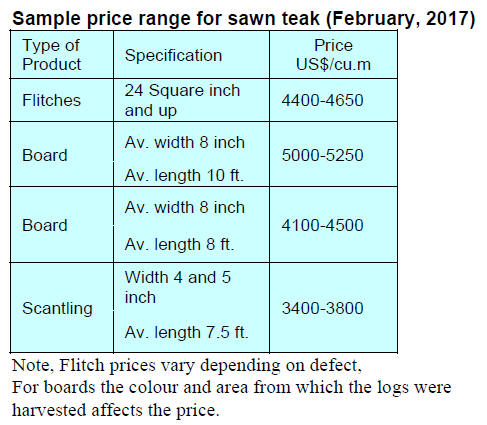
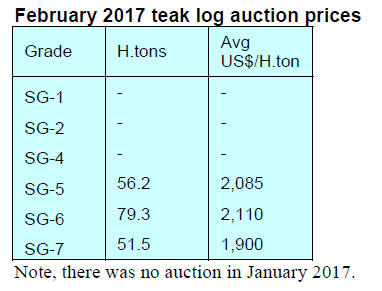
7. INDIA
Finally, Infrastructure Status for
affordable homes
segment of housing market
To try and revive the housing market the government has
finally awarded ‘infrastructure status’ to the affordable
housing segment of the market which should, because of
tax incentives and access to financing, stimulate
investment in this segment. Real estate companies and
CREDAI, (Confederation of Real Estate Developers’
Associations of India) have been lobbying for this change
for 7 years.
Local analysts say this change of status will allow house
builders to access lower interest financing. The
government has redefined the definition of Affordable
Housing projects which provides for 100% tax deduction
related to such housing projects.
In related news the government also announced a package
of tax support for builders with a huge stock of unsold
homes.
The government decision on infrastructure status has,
according to a report from Reuters, prompted Qatar
Holdings (a subsidiary of the state owned Qatar
Investment Authority), to consider investing US$250
million in an affordable housing fund run by one of India's
fund management entities.
For more see:
http://www.reuters.com/article/qatar-india-fundsidUSL5N1FR20Y
Stalled export of rosewood musical instrument parts
With the inclusion of all Dalbergia spp. in Annex II of
CITES Indian exports of products manufactured from this
species have stopped. CITES and the Indian Forest
Service are working with exporters to arrange procedures
and required documentation that will allow exports to
resume.
Analysts report that the delay revolves around which
agency will be charged with issuing CITES certificates.
Manufacturers are looking for a speedy conclusion to this
issue to allow them to keep their factories running.
Plantation teak imports
Local analysts report demand for imported plantation logs
and sawnwood is steady and once again prices have not
changed over the past two weeks.
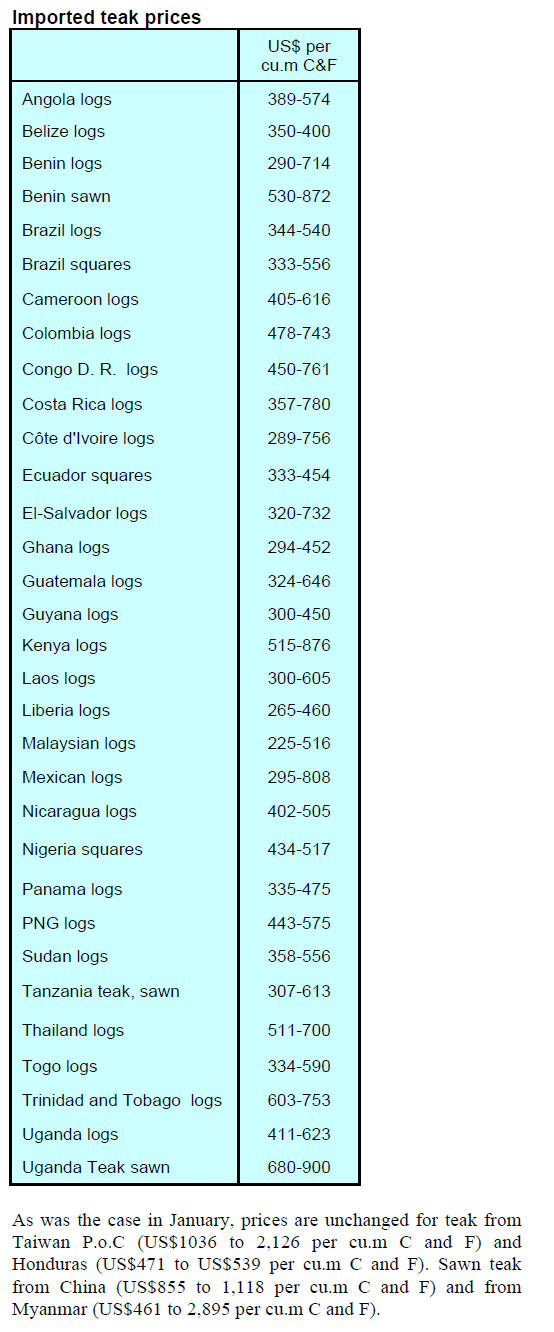
Prices for locally sawn imported hardwoods
Some price movements have been reported with balau
prices moving up and meranti prices sliding slightly.
Adjustment in ex-mill prices for radiata and whitewood
sawnwood have also been reported.
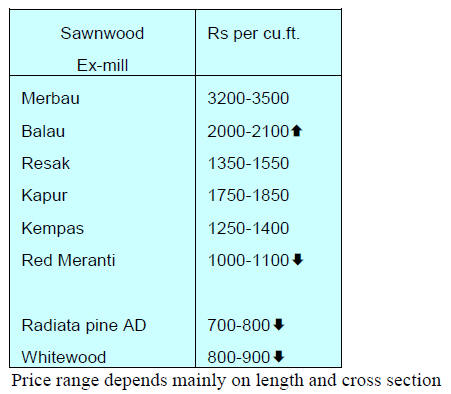
Myanmar teak prices
Demand for imported teak sawnwood from Myanmar is
under pressure from alternatives say analysts. This, along
with problems of procurement, is discouraging local
traders. Production for export is currently supporting price
levels but local sales are weakening which could
eventually drive down prices.
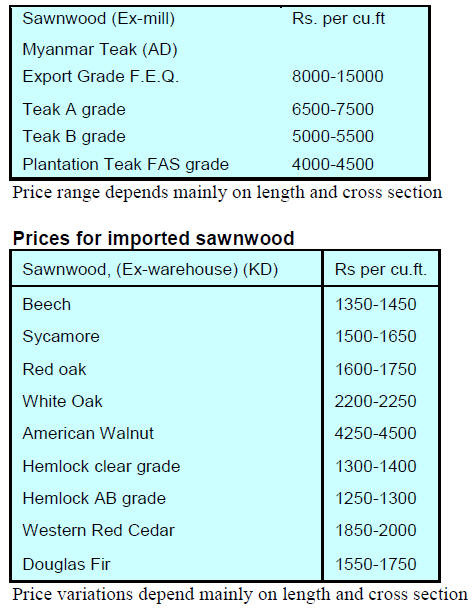
Plywood manufacturers see profits eroded on
several
fronts
Log availability problems continue to effect production
rates and mills are maintaining the higher prices
established recently.
In addition, resin costs and even labour costs have started
to rise which is a challenge for manufacturers. Raw
material suppliers are no longer offering extended credit
but are asking for advance payments.
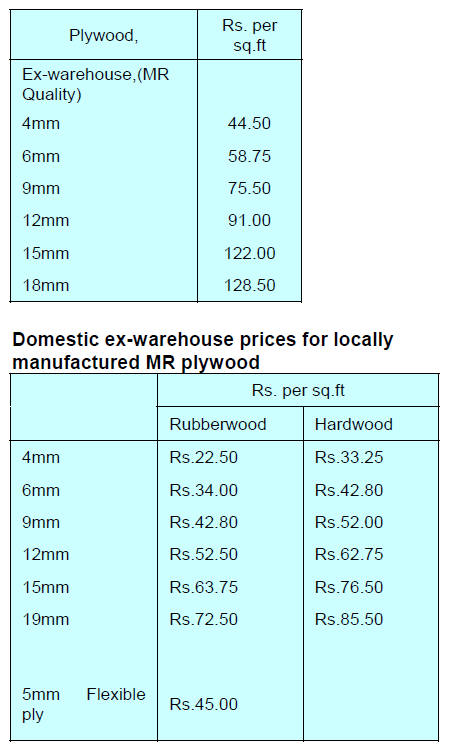
8. BRAZIL
Currency strengthens but interest rates
fall as
economy weakens
The National Consumer Price Index (IPCA) for January
2017 rose by just 0.38%, slightly above the 0.30% of
December 2016, which was the lowest IPCA for a January
since 1994.
In the currency markets the average exchange rate in
January 2017 was BRL 3.20/US$ compared to BRL
4.05/US$ in January 2015 signalling an appreciation of the
Brazilian currency against the US dollar.
At last month’s meeting the Monetary Policy Committee
(COPOM) of the Central Bank reduced the basic interest
rate for the third time in row, from 13.75% to 13%. The
Central Bank’s decision was based on indications that
point to economic activity below expectations.
Development of Brazilian forest industry sector
discussed
Representatives from Brazilian states with forest resources
met, during the inauguration of the new board of directors
of the National Forum of Forest-Based Activities (FNBF)
in Brasilia. The group discussed promoting positive
developments in the Brazilian forest industry.
At the meeting representatives from the Center for Timber
Producers and Exporters in Mato Grosso (CIPEM) pointed
to the need for an awareness raising programme to expand
the use of wood products.
A contribution from WWF-Brazil highlighted the notion
that development of the forestry sector goes beyond
governance and the legal framework and should include
industrialisation, modernisation of industrial parks,
adoption of new technologies and skill development.
On the topic of industrialisation, the Brazilian National
Confederation of Industry noted that the sector has great
potential to expand wood product manufacturing.
Sindimov looks to higher construction activity to lift
furniture demand
A spokesperson from the Furniture Industry Union of São
Paulo (Sindimov-SP) said business recovery amongst
members is likely to be slow but that as growth in other
sectors improves then prospects for the furniture sector
will also rise.
Over the past 12 months the Brazilian economy weakened
by around 16% from the previous 12 months according to
the Brazilian Institute of Geography and Statistics (IBGE).
The Union believes that as the new government gains
confidence the situation in Brazil will change for the
better. To foster business recovery this year furniture
companies in São Paulo will seek to improve profitability
thorough training employees, reducing production and
strengthening management.
According to the Market Intelligence Institute (IEMI), the
2017 growth in the furniture production could reach 2%
which equates to around 404 million items. In 2016,
production was approximately 396 million pieces, a 7.7%
decline on 2015 levels.
Export round up
In January 2017 Brazilian exports of wood-based products
(except pulp and paper) increased 20.0% in value
compared to January 2016, from US$175.2 million to
US$210.3 million.
The value of pine sawnwood exports fell 82% between
January 2016 (US$20.2 million) and January 2017
(US$3.7 million). In terms of volume the change was
102,000 cu.m in January 2015 to just 18,000 cu.m this
January.
In contrast, the volume of tropical sawnwood exports rose
32% from 24,800 cu.m in January 2016 to 32,800 cu.m in
January this year.
However the value of these exports increased by just 13%
from US$12.1 million in January last year to US$ 13.7
million this year.
Brazil’s pine plywood exports increased 31% in value in
January 2017 in comparison with January 2016 levels,
from US$26.6 million to US$ 34.8 million. In volume
terms exports increased 29% over the same period.
Tropical plywood exports from Brazil increased
significantly in volume and in value in January this year
rising from 6,200 cu.m (US$2.2 million) in January 2016
to 10,600 cu.m (US$3.9 million).
The value of wooden furniture exports also rose in January
from US$23.6 million in January 2015 to US$26.6 million
in January this year.
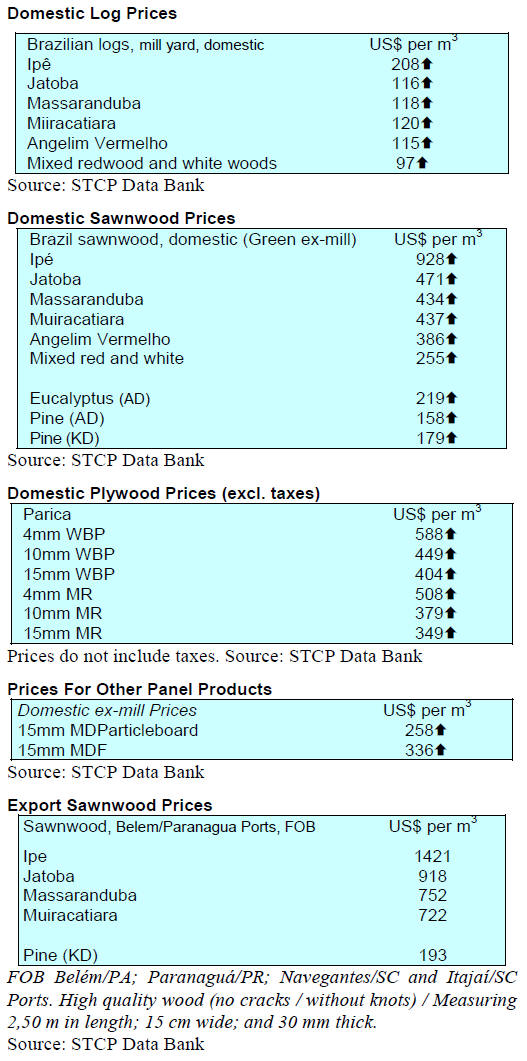
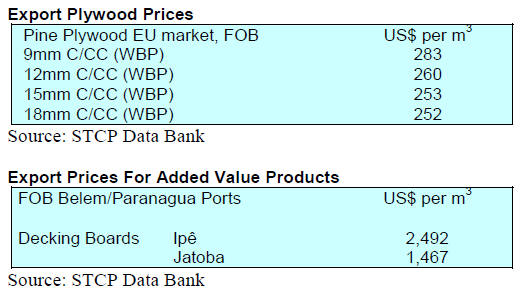
9.
PERU
Forestry Development Board has first
formal meeting
The new created Forestry Development Executive Board
has met for the first time and was addressed by the Deputy
Minister of Agricultural Policies, Benjamín Quijandria.
The minster charged the Board with coming up with a
work plan to identify and promote action for the efficient
and sustainable management of the country’s forest.
This Board has be created to plan for the sustainable
development of the forestry and their mandate covers the
entire supply chain and thus involves industry players.
Various public institutions, regional governments,
business associations and representatives of indigenous
organisations that on the Board agreed to maintain a
permanent dialogue.
In support of the dialogue, Alfredo Biasevich, Chairman
of the Forestry Committee of the National Society of
Industries, said the commonly held view that deforestation
is associated with commercial logging is conceptually
wrong pointing out that deforestation is caused by land use
change for agriculture, livestock faming and mining.
Peruvian exporters anticipate US$2 million from
attendance at DOMOTEX
The intense and rising competitiveness in the European
flooring sector was apparent at DOMOTEX 2017 which
was attended by a few companies from Peru. Domotex
2017 was held in Hannover, Germany and is a major
European fair specializing floor coverings.
The Peruvian group at the show anticipate that sales in the
region of US$2 million will be generated from the
business contacts made at the show. The participants from
Peru estimated that each received around 50 business
enquiries from potential customers and distributors mainly
in Europe and Asia.
Peruvian companies promoted their certified wood
products which strengthened their sales pitch especially
with EU buyers. Peruvian exports of certified wood
products were almost US$10 million last year.
http://gestion.pe/economia/exportadores-peruanos-proyectannegocios-
us-2-millones-feria-europea-pisos-y-revestimientos-
2182049
